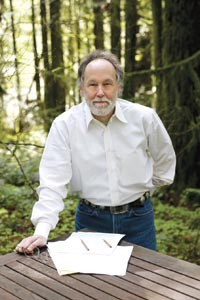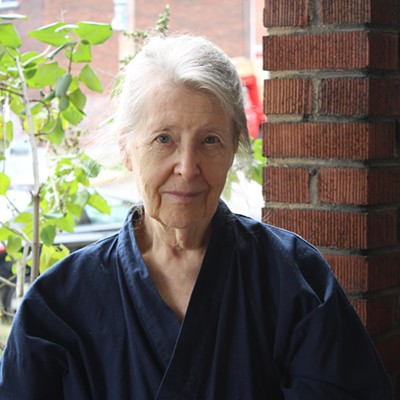Every couple of years, writer Barry Lopez assigns himself a trip that he knows "will knock me over backwards." And it's not the sort of travel you might expect from the naturalist author of such classics as Of Wolves and Men (1978) and Arctic Dreams (1986).
For instance, two years ago, Lopez visited not the tundra or a temperate rainforest, but Beirut, Tajikistan, Afghanistan and Northern Sumatra -- the latter among the places pounded by the 2005 tsunami.
Such travel is, on one hand, consonant with Lopez's lifelong fascination with humanity's sense of place -- the ways culture connects to geography and wildlife -- and with the broad curiosity of a man who's written eight works of fiction. But in the face of global environmental crisis, it's also a way for Lopez to check himself. A privileged Westerner can be enlightened about nature, but he can also suffer a certain kind of blindness. And walking the streets of Kabul, where teen-agers carry automatic weapons just to survive, is one way to reframe one's worldview.
"I put myself deliberately in circumstances that make it very difficult to be cavalier about human suffering," says Lopez, 65, by phone from his home in Western Oregon. "I go so whatever I have to say about anything is informed by something that I just can't get out of the newspaper."
Don't misunderstand: Lopez, who visits the Drue Heinz Lecture Series on Mon., Feb. 8, is deeply urgent about threats like climate change. "We're looking at a situation in which the number of people has increased so vastly, and the technologies have produced such an impact in terms of atmospheric chemistry, that we can't go down this path any more," he says. "We're at a crossroads now that we have to recognize that we're either going to change the direction of Western Civilization, or we're going to be living a very different kind of life the next 20 to 30 years."
But to Lopez, the dangers of imminent ecological collapse oblige him ethically in a particular way. "I am not a public intellectual," he says. "I am not a social organizer, I am not an environmentalist. I am a writer."
He seeks, in other words, to communicate to the average person the importance of the land. (Click here to hear Lopez explain what he means when he wrote, "in reclaiming wild lands, we reclaim our dignity.") Others increasingly see him that way, too: Last year, no less a checkout-line staple than Oprah Winfrey's O magazine asked Lopez to write the introduction to its green-themed April 2009 issue.
If Lopez's call there for "inventing together another way of life, one less harmful, less cruel than the one we have now" sounded epic, he noted his own writerly role with humility. "Without other men and women, hard at work devising a safer future for every life on Earth, my task is like the song of a man living alone in a box: beautiful, perhaps, but of no great help to humanity."
In his writing, Lopez explores why a strong connection to nature is necessary for our cultural health as well as for the restoration of a badly damaged planet. His provocative 1992 essay The Rediscovery of America, for instance, argues that Americans have failed to value the land they live on because they've never seen it, truly, as "home," only as a bundle of resources to exploit.
But harangues are not his style.
"If you or I read an article in a magazine that implies that you don't know, and the writer knows, and you need to come around to the writer's point of view, you tend to turn the page," he says. "If the writer can say to you, 'Look, I'm in this too,' you're much more at ease in the article than you would be if the guy says, 'I've talked to the right people, and here's what you need to know.'
"I have no interest in being the reader's authority," he continues. "My entire interest is in being the reader's companion."
To change environmental attitudes, "we have got to find ways to frame these issues so that people for whom it's not a No. 1 priority can basically sign off on it," Lopez says. "You can't ask everybody to drop what they're doing to take care of x, y and z. They have to change diapers. They have to set a table and put food on it. They have to drive a bus every day. ... You've got to have some kind of perspective, and you've got to have compassion for people whose frame of reference is different from yours."
But to salve the earth and salvage civilization, what stories should we tell each other? Lopez believes one story we need is not new so much as simply forgotten. In contrast to the modern compulsion for constant change, he cites the longevity of Stone Age cultures -- 50,000 years of Aboriginal culture, for example, and the millennia over which the style of Europe's cave paintings remained constant. "What is it we had as human communities that really seemed to work?"
The story of healing, Lopez says, is no single story. "I'm not, nor is any writer I know, the person who's going to write the story," Lopez says. "We're traveling in the dark, and everybody has a flashlight, and what we need to do is ask everybody to agree on a direction in which to point the flashlight. And with that level of illumination, we'll have a much better understanding of what we're being called on to do."
Barry Lopez speaks at the Drue Heinz Lecture Series. 7:30 p.m. Mon., Feb. 8. Carnegie Music Hall, 4400 Forbes Ave., Oakland. $10-25. 412-622-8866














